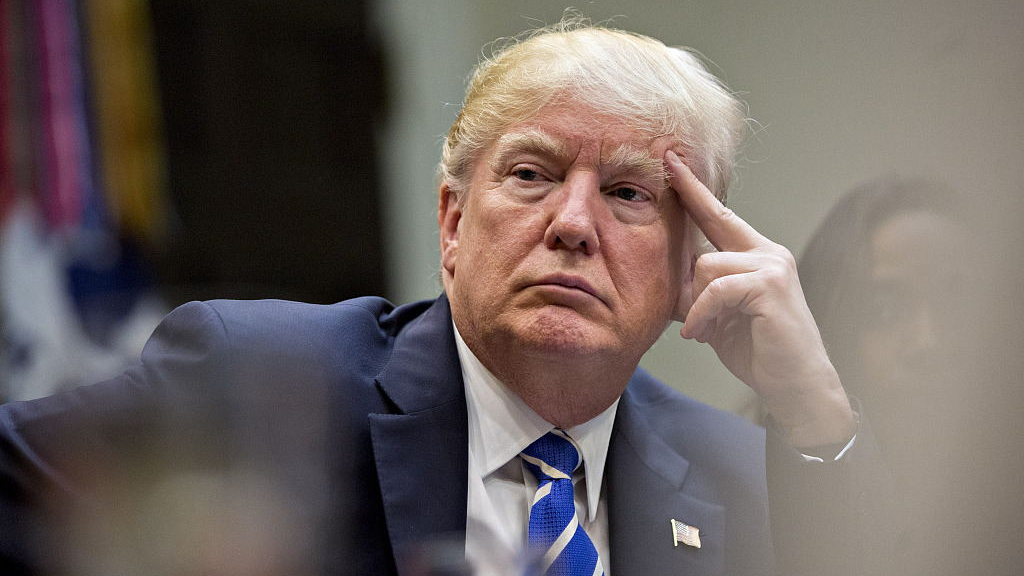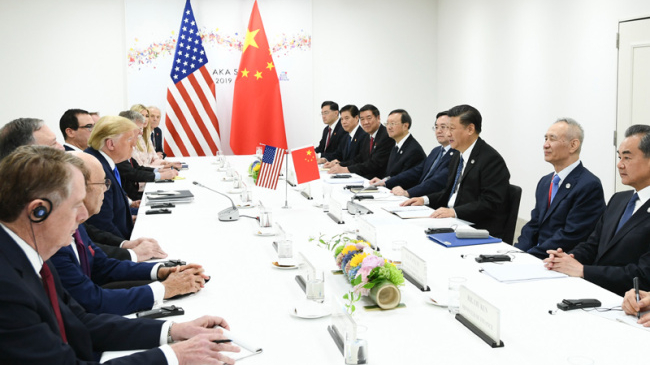

Editor's note: Zhu Zheng is an assistant professor focusing on constitutional law and politics at China University of Political Science and Law. The article reflects the author's opinions, and not necessarily the views of CGTN.
On Wednesday, Beijing called on Washington to show "determination and perseverance" and to work with the Chinese side in reaching a mutually beneficial trade deal as soon as possible.
This call was made against the backdrop where Trump on Tuesday once again threatened to raise the scepter of fresh levies on Chinese goods, saying that there was still a long way to go before a final deal is reached, and another 325 billion U.S. dollars of Chinese goods can be put a tariff on, if the U.S. wants.
Apparently, Trump's remarks cast shadow on the U.S.' sincerity over the trade negotiations, and as the Chinese side believed, they "put up new obstacles for the trade negotiations."
The bewildering messages by the U.S. delegation – its willingness to call a ceasefire at G20 summit with China and President Trump's threat to go back to war – further exposes Washington's wavering stand on trade.
Perhaps it is to be seen as some kind of negotiating tactics to enlarge America's economic interests.

Chinese President Xi Jinping meets with U.S. President Donald Trump in Osaka, Japan, June 29, 2019. /Xinhua Photo
After all, only last week, Trump accused China of letting the U.S. down by not promptly buying more U.S. farm products, and China very soon starting to purchase American agricultural commodities, in his perception, is a condition to restart a trade negotiation. It all seems clear to some observers that what the U.S. wants are merely business gains.
But according to certain sources, the U.S. is actually asking for more than China can purchase. And by setting overwhelming conditions on the trade talks and urging China to include structural reforms, which are both not attainable in the short term, the U.S. is in effect not hoping to timely strike a deal, but why?
Certainly, the longer the trade conflict lingers on, the bigger blow it will deal to China's economy, believes the White House. The latest indicators showed that China's economic growth fell to a relatively slow pace, and Mr. Trump tweeted that this means the trade war is wreaking destruction on China.
However, it can be argued that China's slower economic growth was due more to government efforts to whittle down excessive manufacturing capacity, and China's economy growth of 6.2 percent in the second quarter still falls within Beijing's GDP target for 2019 of between 6 to 6.5 percent nonetheless.
Besides, the fall in U.S. exports to China is by all means harming American economy, and if the conflict continues, it is a matter of time to see havoc in the U.S.
So, apart from the economic calculations, what else is Washington eyeing? Some strategic perspectives can be added to unveil the complex situation as follows.

Chinese-made hats are displayed for sale at a Manhattan department store in New York City, the U.S., May 7, 2019. /VCG Photo
First, there are reasons to believe that the U.S. is awaiting Taiwan leadership election to make its next move. After Kaohsiung mayor Han Kuo-yu, who supports the "1992 Consensus" as the political foundation for cross-Strait political trust, won the Kuomintang party primary poll, there will be a straight race between Han and Tsai Ing-wen, the incumbent leader of Taiwan, a trusted pair of hands viewed by the U.S.
Ms. Tsai will use her strong links with Washington as a selling point to race ahead in the upcoming election, and her rival Mr. Han, by contrast, will be very likely accused of being too close to Beijing, despite the so-called "Han wave" sweeping Taiwan in recent months which have gained him island-wide popularity.
Without any doubt, next year's showdown on the island will be put high on the U.S.' agenda, and it will directly affect Trump's trade policy.
Moreover, the recent Hong Kong turmoil and the Sino-U.S. difference over the South China Sea can also be taken advantage of by Washington as bargaining chips for bilateral trade negotiations.
While Washington and Beijing seem to have no agreement on two key issues that are directly linked to trade – how to deal with the existing tariffs and how much China should purchase U.S. goods over the next few years, more deeply, that the two powers cannot be in accord with some major diplomatic, military and political issues serve as the real reasons for Washington to be hesitant to show its trade card for now.
(If you want to contribute and have specific expertise, please contact us at opinions@cgtn.com.)

Copyright © 2018 CGTN. Beijing ICP prepared NO.16065310-3
Copyright © 2018 CGTN. Beijing ICP prepared NO.16065310-3